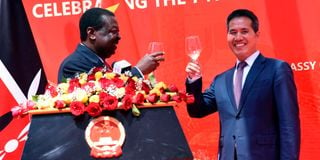Premium
After a tricky year, Kenya to formalise China policy

Prime Cabinet Secretary Musalia Mudavadi and Chinese Ambassador to Kenya Zhou Pingjian toast during celebrations of the 74th Anniversary of the Founding of the People's Republic of China at the Chinese Embassy in Nairobi on September 27, 2023.
Kenya says it will put its China policy in writing, ostensibly taking lessons from the chaotic first year of President William Ruto's term in dealing with Beijing.
This is the takeaway from last week's trip to China by Prime Cabinet Secretary Musalia Mudavadi, who is also Cabinet Secretary for Foreign and Diaspora Affairs.
Mr Mudavadi toured Beijing between Tuesday and Thursday last week at the invitation of his Chinese counterpart, Wang Yi. It was his first trip to China since he took over the Foreign Affairs docket from Dr Alfred Mutua in October. At the time, it was clear that Nairobi needed to do something about China, a country that officials had publicly criticised for either lumping Kenya with debt or accusing Chinese nationals of saturating local retail space.
After the trip, however, Mudavadi says Kenya is thinking 60 years from now and wants to cement the comprehensive strategic partnership it has enjoyed with China in recent years.
The first step is to set up focal points in the government, a kind of agency that will deal directly with Chinese affairs.
A joint dispatch from the two sides said they had agreed to "institutionalise the joint vision (of the Kenya-China Strategic Partnership for the next 60 years) in their respective foreign policies and establish joint technical teams to work on the details of the pillars of the vision and its implementation framework".
No timelines were given, but the pronouncement alone may signal a change of course to correct the mistakes of the past year. Mr Mudavadi said China remained "invaluable to the realisation of Kenya's national development priorities, particularly in the areas of roads and rail transport, as well as green energy infrastructure and ICT," according to a joint dispatch, signalling a continued role for China in these sectors.
Political views
Nairobi also aligned itself with China's political views: Reiterating the one-China policy to reassure Beijing that it won't have relations with Taiwan, and choosing to support what China calls universal values of peace, development, fairness, justice, democracy and freedom, while opposing "interference in other countries' internal affairs under the banner of 'democracy and human rights". The latest may be a dig at the West, which China blames for routinely criticising Beijing's policies towards minorities in China.
Ahead of Mr Mudavadi's trip to China, Beijing had successfully lobbied for a good rating at the latest session of the United Nations Human Rights Council in Geneva in January.
The two ministers agreed that the world was now multipolar and that there was a need for reform of the international financial infrastructure, such as the International Monetary Fund and the World Bank, as well as the UN Security Council and its decisions on peace and security challenges around the world.
Some observers say Mr Mudavadi's trip could help turn relations around by opening channels of communication and learning about China.
"China is an important partner and Nairobi should reflect the seriousness of the relationship through policy and rhetoric," said Dr Cavince Adhere, a China-Africa analyst in Nairobi.
"A number of development initiatives spearheaded by China, such as the Belt and Road Initiative (BRI) and the Global Development Initiative (GDI), offer Kenya opportunities for partnership and mutual gain."
The BRI was proposed in 2013 to steer the infrastructure projects China needs to boost trade around the world. The GDI, proposed in 2021, seeks healthier, greener development tied to the UN's Sustainable Development Goals.
Kenya knows it will need money to expand any of these projects. In January, the Cabinet approved a subscription to the Asian Infrastructure Investment Bank (AIIB), one of the lenders that funds regional connectivity and green infrastructure projects in selected countries.
The Cabinet said this was "part of the administration's agenda to enhance regional cooperation and connectivity through the Green Economy".
Voting power
The AIIB is the world's second-largest multilateral development institution, and China holds 26.5 per cent of the voting power. Besides money, however, Kenya may need to ensure its business environment.
"Create enabling conditions for international investors, including Chinese companies, to thrive. This will facilitate President Ruto's desire to implement public-private partnership projects for the benefit of the Kenyan people," added Dr Adhere.
"Invest in understanding China, not only as an important partner for Kenya but also as an indispensable global player. Kenya's knowledge bureaucracy must treat China as the global power that it is and increasingly seek leverage on how best to harness the potential of the relationship,” he added.





